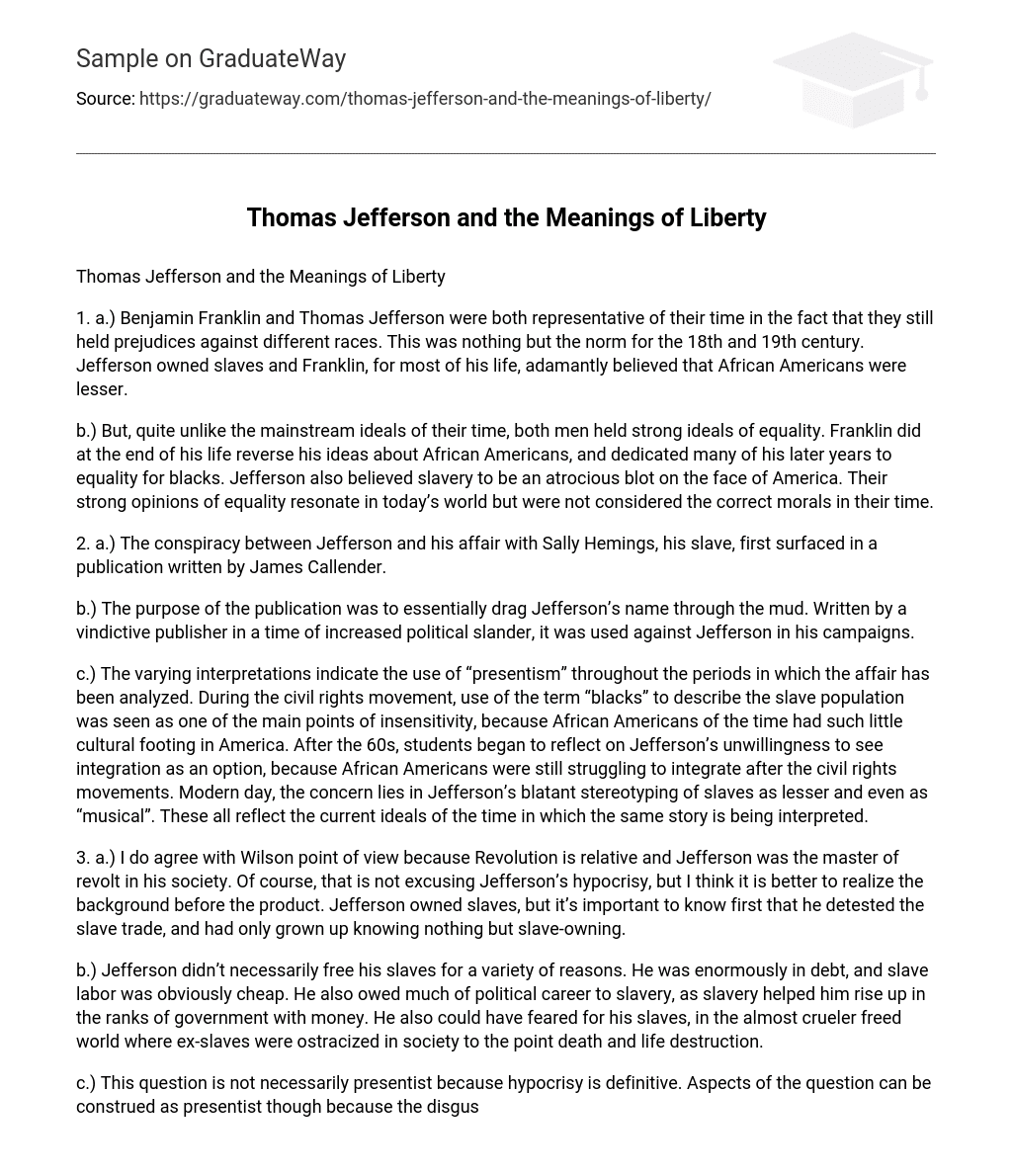Benjamin Franklin and Thomas Jefferson, both representatives of the 18th and 19th century, shared prejudices against different races. Jefferson owned slaves while Franklin maintained the belief throughout his life that African Americans were inferior.
B.) Despite the prevailing beliefs of their era, both Franklin and Jefferson passionately supported equality. Towards the end of his life, Franklin altered his stance on African Americans and dedicated much of his later years to promoting racial equality. Similarly, Jefferson considered slavery a repugnant blemish on America. Even though their views were deemed morally wrong at the time, their steadfast dedication to equality continues to have an impact in today’s world.
2. a.) James Callender first published the conspiracy involving Jefferson and his relationship with Sally Hemings, his slave.
The publication’s purpose was to tarnish Jefferson’s reputation. It was written by a malicious publisher during a period of heightened political slander and was utilized to attack Jefferson during his campaigns.
c.) The differing interpretations of the affair indicate the use of “presentism” throughout its analysis across different time periods. In the civil rights movement era, the term “blacks” used to describe slaves was viewed as insensitive due to the limited cultural integration African Americans had in America at that time. Post-60s, students reflected on Jefferson’s reluctance towards integration, as African Americans still faced struggles in this regard even after the civil rights movements. Presently, there is concern over Jefferson’s overt stereotyping of slaves as inferior and even possessing musical talent. All these interpretations reflect the prevailing ideals of the respective time periods in which the same story is being examined.
3. a.) I share Wilson’s viewpoint that Revolution is subjective and Jefferson had extensive knowledge of uprisings in his community. Nevertheless, this does not excuse Jefferson’s hypocrisy. It is essential to consider the context before making judgments. Despite owning slaves, it is crucial to recognize that Jefferson vehemently opposed the slave trade and was raised in a society where owning slaves was customary.
b.) Jefferson did not necessarily emancipate his slaves due to various factors. His substantial debt and the economic advantage of slave labor were significant factors. Moreover, his political advancement was greatly facilitated by slavery, as it provided him with the financial means to rise within government ranks. Additionally, Jefferson may have had concerns for the wellbeing of his slaves in a post-emancipation society, where freed individuals faced severe social exclusion and potential devastation.
c.) While this question is not inherently presentist due to the definitive nature of hypocrisy, certain aspects of it can be interpreted as presentist. This is because the disgust towards Jefferson owning slaves stems from present-day standards of anti-racism being imposed on a society that was inherently racist.
4. a.) The Declaration of Independence defines liberty as personal and universal freedom, emphasizing the freedom to pursue happiness without being constrained by any laws, regardless of their quality. It also highlights liberty as the right for all individuals, not just selfish personal freedom. Furthermore, it interprets liberty as national independence, liberating the entire country from oppressive restraints. The Declaration of Independence aimed to encompass these various understandings of freedom: individual freedom, humanity’s freedom, and national freedom.
In the eighteenth century, freedom was widespread for individuals. During the early stages of America, anti-federalists rebelliously viewed liberty as a way to almost anarchy. They desired the absence of restrictive laws in order to pursue their livelihoods and blissfully exist with selfishness as their guide.
c.) The concept of freedom for everyone has become increasingly common. This shift may be attributed to the prosperity of our country. Jefferson cautioned against an immobile government paired with a forward-thinking population. There has been a rise in the number of social rights movements compared to the eighteenth century, when personal or party interests took precedence over morality.
5. Revisionism that highlights the imperfections of revered individuals can create a pervasive negativity towards these heroic figures, despite their valuable moral teachings. Such revisionism emphasizes that even the most exceptional among us possess inherent flaws. However, it also assists in humanizing these esteemed personalities, whose reputations often overshadow reality. In doing so, it serves as a reminder that political achievements do not automatically equate to moral excellence.
b.) The trend in historical writing refers to a rise in negativity and revolution within our society, as we reject established figures of greatness and create our own versions. This shift suggests a lack of trust or satisfaction with existing institutions of morality, politics, and society, as modern youth culture establishes their own separate identity.





